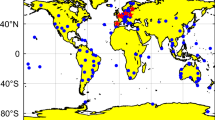Abstract
Both inter-system and inter-frequency code biases (ISCB and IFCB) embodied in the multi-GNSS single-frequency precise point positioning (MSFPPP) exhibit mainly as systematic errors. Comprehensive analysis of the ISCB and IFCB characteristics and proper assimilation of their impact on MSFPPP are very important. We study the simultaneous estimation of all ISCBs for GLONASS, BDS and Galileo relative to GPS and the IFCBs of GLONASS by using our newly formulated estimable ionospheric-weighted MSFPPP model. Then, the daily stability of the ISCBs and IFCBs is examined, on which the application strategy is advised to improve the MSFPPP performance. One-month multi-GNSS single-frequency observation at 60 stations with eight types of receivers is carried out. The results indicate that the ISCBs of Galileo are most stable, followed by GLONASS and BDS, and all ISCBs and IFCBs are sufficiently stable on a daily scale. Imposing this stable information on the MSFPPP model can significantly enhance the model strength and improve the positioning performance.













Similar content being viewed by others
References
Cai C, Gao Y (2009) A combined GPS/GLONASS navigation algorithm for use with limited satellite visibility. J Navig 62(4):671–685
Cai C, Gao Y (2013) Modeling and assessment of combined GPS/GLONASS precise point positioning. GPS Solut 17(2):223–236
Cai C, Liu Z, Luo X (2013) Single-frequency ionosphere-free precise point positioning using combined GPS and GLONASS observations. J Navig 66(3):417–434
Chen J, Zhang Y, Wang J, Yang S, Dong D, Wang J, Qu W, Wu B (2015) A simplified and unified model of multi-GNSS precise point positioning. Adv Space Res 55(1):125–134
Dach R, Schaer S, Lutz S, Meindl M, Beutler G (2010) Combining the observations from different GNSS. In: EUREF 2010 Symposium, pp 02–05
Geng J, Shi C (2017) Rapid initialization of real-time PPP by resolving undifferenced GPS and GLONASS ambiguities simultaneously. J Geod 91(4):361–374
Gioia C, Borio D (2016) A statistical characterization of the Galileo-to-GPS inter-system bias. J Geod 90(11):1279–1291
Huang G, Zhang Q, Fu W, Guo H (2015) GPS/GLONASS time offset monitoring based on combined precise point positioning (PPP) approach. Adv Space Res 55(12):2950–2960
Jiang N, Xu Y, Xu T, Xu G, Sun Z, Schuh H (2015) GPS/BDS short-term ISCB modelling and prediction. GPS Solut 21(1):163–175
Leick A, Rapoport L, Tatarnikov D (2015) GPS satellite surveying, 4th edn. Wiley, New York
Li B (2016) Stochastic modeling of triple-frequency BeiDou signals: estimation, assessment and impact analysis. J Geod 90(7):593–610
Li X, Zhang X, Ren X, Fritsche M, Wickert J, Schuh H (2015a) Precise positioning with current multi-constellation global navigation satellite systems: GPS, GLONASS, Galileo and BeiDou. Sci Rep 5:8328
Li X, Ge M, Dai X, Ren X, Fritsche M, Wickert J, Schuh H (2015b) Accuracy and reliability of multi-GNSS real-time precise positioning: GPS, GLONASS, BeiDou, and Galileo. J Geod 89(6):607–635
Li B, Li Z, Zhang Z, Tan Y (2017) ERTK: extra-wide-lane RTK of triple-frequency GNSS signals. J Geod 91(9):1031–1047
Montenbruck O, Steigenberger P, Prange L, Deng Z, Zhao Q, Perosanz F, Romero I, Noll C, Stürze A, Weber G, Schmid R, MacLeod K, Schaer S (2017) The multi-GNSS experiment (MGEX) of the international GNSS service (IGS)-achievements, prospects and challenges. Adv Space Res 59(7):1671–1697
Nandakumaran N, Teunissen PJG, Noor R (2013) BeiDou inter-satellite-type bias evaluation and calibration for mixed receiver attitude determination. Sensors 13(7):9435–9463
Odijk D, Teunissen PJG (2013) Characterization of between-receiver GPS-Galileo inter-system biases and their effect on mixed ambiguity resolution. GPS Solut 17(4):521–533
Øvstedal O (2002) Absolute positioning with single-frequency GPS receivers. GPS Solut 5(4):33–44
Riley WJ (2008) Handbook of frequency stability analysis Hamilton Technical Services Beaufort. NIST 1065:1–123
Shi C, Yi W, Song W, Lou Y, Yao Y, Zhang R (2013) GLONASS pseudorange inter-channel biases and their effects on combined GPS/GLONASS precise point positioning. GPS Solut 17(4):439–451
Sterle O, Stopar B, Prešeren PP (2015) Single-frequency precise point positioning: an analytical approach. J Geod 89(8):793–810
Teng Y, Wang J (2014) New characteristics of geometric dilution of precision (GDOP) for Multi-GNSS constellations. J Navig 67(6):1–11
Torre AD, Caporali A (2015) An analysis of intersystem biases for multi-GNSS positioning. GPS Solut 19(2):297–307
Uhlemann M, Gendt G, Ramatschi M, Deng Z (2015) GFZ global multi- GNSS network and data processing results. In: Rizos C, Willis P (eds) IAG 150 Years. International Association of Geodesy Symposia, vol 143, pp 673–679
Zeng A, Yang Y, Ming F, Jing Y (2017) BDS-GPS inter-system bias of code observation and its preliminary analysis. GPS Solut 21(2):1–9
Zhou F, Dong D, Li W, Jiang X, Wickert J, Schuh H (2018a) GAMP: an open-source software of multi-GNSS precise point positioning using undifferenced and uncombined observations. GPS Solut 22(2):33
Zhou F, Dong D, Ge M, Li P, Wickert J, Schuh H (2018b) Simultaneous estimation of GLONASS pseudorange inter-frequency biases in precise point positioning using undifferenced and uncombined observations. GPS Solut 22(1):19
Acknowledgements
This study is sponsored by National Natural Science Foundation of China (41874030, 41622401, 41574023 and 41730102), The Scientific and Technological Innovation Plan from Shanghai Science and Technology Committee (18511101801), The National Key Research and Development Program of China (2016YFB0501802, 2017YFA0603102) and The Fundamental Research Funds for the Central Universities. We are sincerely grateful to the efforts of the IGS MGEX campaign for providing multi-GNSS data and products.
Author information
Authors and Affiliations
Corresponding author
Additional information
Publisher's Note
Springer Nature remains neutral with regard to jurisdictional claims in published maps and institutional affiliations.
Rights and permissions
About this article
Cite this article
Zang, N., Li, B., Nie, L. et al. Inter-system and inter-frequency code biases: simultaneous estimation, daily stability and applications in multi-GNSS single-frequency precise point positioning. GPS Solut 24, 18 (2020). https://doi.org/10.1007/s10291-019-0926-z
Received:
Accepted:
Published:
DOI: https://doi.org/10.1007/s10291-019-0926-z




